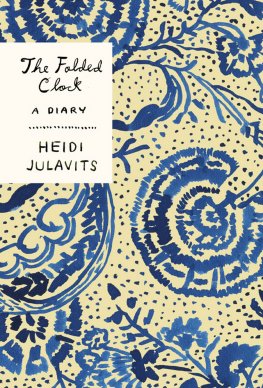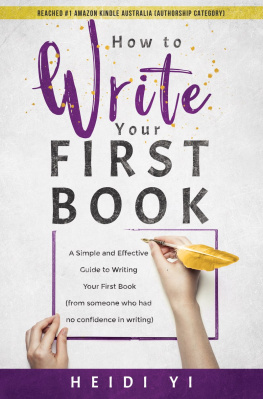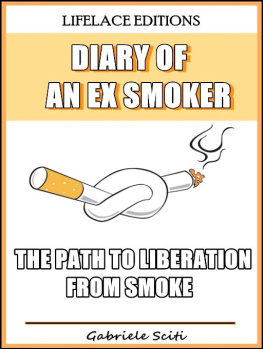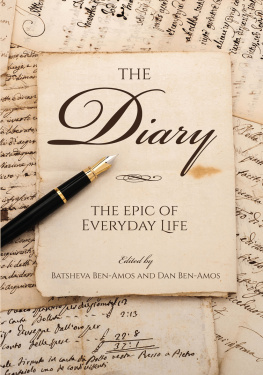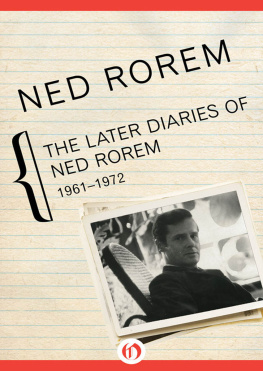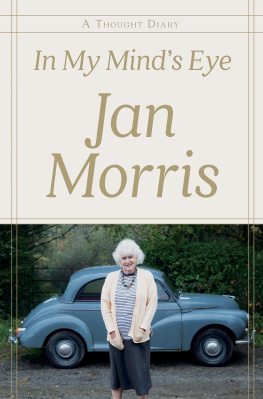Heidi Julavits
The Folded Clock: A Diary
This book is an accounting of two years of my life. I have altered identifying characteristics to protect peoples privacy.
Today I wondered What is the worth of a day? Once, a day was long. It was bright and then it wasnt, meals happened, and school happened, and sports practice, maybe, happened, and two days from this day there would be a test, or an English paper would be due, or there would be a party for which Id been waiting, it would seem, for years. Days were ages. Love bloomed and died in a day. Rages flared and were forgotten and replaced by new rages, also forgotten. Within a day there were discernible hours, and clocks with hands that ticked out each new minute. I would think, Will this day never end? By nightfall, Id feel like a war had been fought. I was wounded; sleep was not enough to heal me. Days would linger in my nerves, aftershocks registered on the electrical plain. Days made a physical impact. Days could hurt.
Not anymore. The day no longer exists. The smallest unit of time I experience is the week. But in recent years the week, like the penny, has also become a uselessly small currency. The month is, more typically, the smallest unit of time I experience. But truthfully months are not so noticeable either. Months happen when things are, with increasing rapidity, due. Tuitions are due, and rent is due, and the health insurance is due. A month is marked, not by a sense that time has passed, but by a series of automated withdrawals. I look at my bank account, near zero, and realize, It must be March.
Since I am suddenly ten years older than I was, it seems, one year ago, I decided to keep a diary. Like many people I kept a diary when I was young. Starting at age eight I wrote in this diary every day, and every day I began my entry with Today I. Today I went to school. Today I went to Andreas house. Today I played in the cemetery. Today I did nothing.
Recently I cited this childhood diary-keeping as the reason I became a writer. I needed to explain to a roomful of people, most of them over seventy years old, why. I could have answered the question in a variety of ways. But I try to anticipate the needs of my audience. I desire to give them an anecdote customized to resonate with their life situation. This desire guides my answers more strongly than truth. What did these people want or need to hear? If I were, like them, nearing the end of my life, I imagine Id be impatient with equivocation and uncertainty. I imagine I would desire clear stories because soon Id be in a grave where my life would be condensed to a name, a date, some commas, a category (Wife).
So I told a clean story. A why story. I said that I became a writer because on one March day, when I was ten, during the interminable gray-scale finale of a typical Maine winter, my father took me to the mall because wed long ago run out of ways to kill time before spring. At the mall, he bought a color TV. On certain practical and emotional levels, his expenditure made sense. Our old TV was black-and-white. We switched between the two and a half available channels by using a pair of pliers to rotate a metal stub, once connected to a dial (now lost). The original antenna (also lost) had been replaced by a clothes hanger. The whole contraption was so pathetic and downtrodden, who could blame a man for trying to bring literal color into the lives of his wife and children, emotionally slogging their way through another mud season?
Unfortunately, my father did not have permission to buy a color TV. At an earlier point in time, hed bought something else without permission, and before that something else, and now he was deeply in permissions debt. He would never get permission to buy anything ever again. Every acquisition was unauthorized. This did not prevent him from buying the TV.
My father also bought me, if I promised to write in it, a diary.
I started the diary the next day. I wrote:
Today I woke up and watched TV.
I found and reread these diaries about ten years ago. Before I found and reread them, I was proud of what the fact of my rigorous diary keeping predicted about me. Id been fated to be a writer! I had proof of my doggedness many volumes of it. I imagined the diaries published at some future date, when my literary fame might bestow upon them an artistic and biographical value. I believed I was born to posthumous greatness. I often imagined myself more famous when dead than when alive.
The actual diaries, however, fail to corroborate the myth Id concocted for myself. They reveal me to possess the mind, not of a future writer, but of a future paranoid tax auditor. I exhibited no imagination, no trace of a style, no wit, no personality. Each entry is an accounting of (or an expressed anxiety about) my school performance.
Today at school I got a 100 on my math test and I finished my science assignment. I am all set for my literature report but Im really scared!
Today I gave my report and I got an A.
Today I didnt finish my worksheet and I am in trouble.
Today I really flubbed up in my math test because we have to get 5 100s in a row and I had 2 100s but then today I got a 99!
Later, when I turn ten, the tone starts to change. I stop worrying and start fretfully wishing.
I want to have a thin lovely figure, very pretty and smart and Alec and I love each other, never sick, happy life, my family isnt killed, I am a great ATHLETE, popular, lots of friends, no pimples, a nicer nose.
Virginia Woolf wrote, I do not know how far I differ from other people. I tend to think, based on the above evidence, that I dont differ much. Admirable, I guess, is my absence of guile or pretense. I was clearly not prepping very well for my posthumous fame, as certain people I know prep and have been prepping practically since birth for theirs. Everything written by these people even an online exchange with a computer repair technician is treated as archival evidence to be scoured by future scholars. If the future scholars come to care at all about me, I wish them to know this: with certain variations (substitute my husband for Alec), the desires of my ten-year-old self have more or less held steady for the past thirty-odd years.
So I told the seventy-year-olds a story that stressed the continuity (the immortality!) of self. What I failed to mention, however, was my recent worry: As a writer, I have mistaken how to use words. I write too much. I write like some people talk to fill silence. When I write, I am trying through the movement of my fingers to reach my head. Im trying to build a word ladder up to my brain. Eventually these words help me come to an idea, and then I rewrite and rewrite and rewrite what Id already written (when I had no idea what I was writing about) until the path of thinking, in retrospect, feels immediate. Whats on the page appears to have busted out of my head and traveled down my arms and through my fingers and my keyboard and coalesced on the screen. But it didnt happen like that; it never happens like that.
Today my friend asked me, Am I crazy? She is convinced that her husband is having an affair. We were in her apartment drinking beer. She seemed oddly energized by the prospect of this affair, as if we were gossiping about the maybe-infidelity of a person not married to her.
Her husband, she said, had become friendly with the single woman who used to live in the neighboring apartment. The woman had since moved to San Francisco; however, she called her husband regularly to check on her mail. Was there a package for her in their lobby? According to my friend, her husband always left the room so he could speak to the woman in private.

